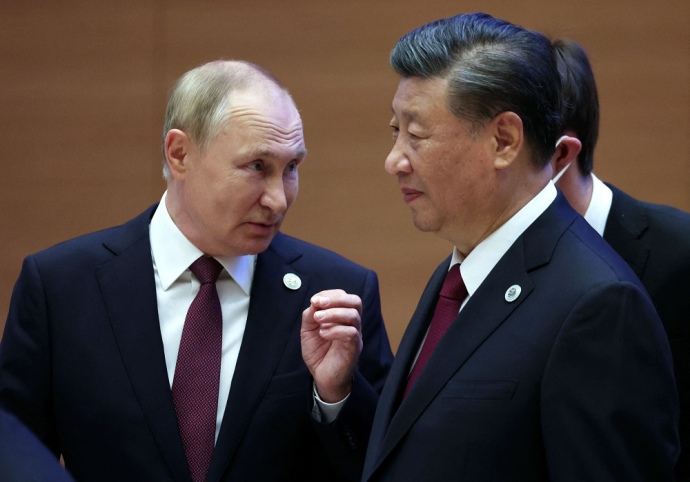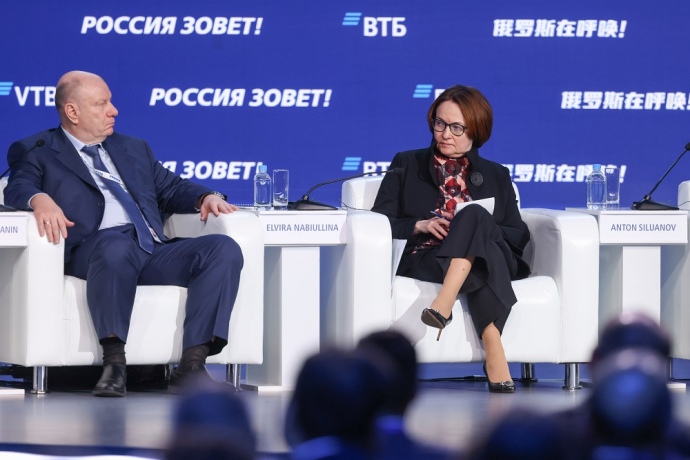Russia has legalised cryptocurrencies. Will this help the Russians evade Western sanctions?

There’s a thin line between love and hate, especially when it comes to the Russian government's attitude towards cryptocurrencies.
Central Bank Governor Elvira Nabiullina said in December 2021: "We cannot welcome investments in such assets. We believe Russia’s financial infrastructure should not be used for cryptocurrency transactions."
In July 2024 she said the complete opposite: "We expect the first payments in cryptocurrencies to take place by the end of this year."
The Kremlin initially saw cryptocurrencies as a threat. They were originally created as an alternative to the traditional financial system, so to an autocratic regime, they looked like an uncontrollable tool.
Now that the civilised world has designated Russia as a state sponsor of terrorism, however, cryptocurrencies have become one of the last remaining ways to ensure that payments under export and import contracts can be made.[BANNER1]
In the summer of 2024, the Russian State Duma (the lower chamber of the Russian parliament) legalised cryptocurrency and crypto mining. The Kremlin has made no secret of the fact that this is a consequence of the sanctions that have made trade difficult even with friendly countries since the end of 2023. Will cryptocurrencies save the Russian economy?
Unfriendly actions by "friendly" countries
In 2024, Russia's foreign trade began to slump due to problems making international settlements under export and import contracts. Foreign banks were refusing to accept payments from Russia for fear of secondary US sanctions.
"Payments are vulnerable to sanctions when they are made in dollars and euros via SWIFT," says the National Bank of Ukraine, which is involved in formulating sanctions policy towards Russia. "Russia’s difficulties with traditional payment channels are confirmed by almost daily reports that banks in China, Türkiye and the UAE are delaying or returning payments for certain categories of products and services."
The problems with payments from China have been particularly painful for the Kremlin, as China has become Moscow's largest trading partner since the start of the full-scale war. Russian companies complain that since early 2024, Chinese banks have been delaying payments from Russia or refusing to process them at all. And it’s not just dollar-denominated payments that are affected, but also those in yuan.
"The money was left hanging in Chinese banks for several months for verification. The bankers requested additional information, from product codes to information about the end buyer and the exact route of the goods. In the end, the payment was returned anyway," the Moscow Times quoted some Russian importers as saying.[BANNER2]
The Moscow Times journalists said at least a quarter of payments from Russian companies are rejected by Chinese banks, and in about 60% of cases, the money is "left hanging" indefinitely while checks are carried out. Only 15% of transactions are successful.

The problem has become so widespread that Russian ruler Vladimir Putin devoted his visit to China in May to solving it. He asked Chinese leader Xi Jinping to tone down Chinese banks' approach to payments from Russia so that "mutual trade is reliably protected from the negative influence of third countries".
However, the situation for Russian companies has not improved since then, and perhaps the only positive economic impact of Putin's visit to Beijing was the simplification of Russian calf cartilage and Jerusalem artichoke exports to China.[BANNER3]
As a result, Russian imports in the first half of 2024 were a third lower than Russian analysts had expected. According to their calculations, imports were supposed to have grown by 13%, but they actually fell by 14% compared to the same period in 2023.
The payment problems have prompted Russian companies to look for workarounds. Some of them have started to go through intermediaries registered in "friendly" countries such as Serbia, Belarus and Kazakhstan for their interactions with Chinese banks. But that doesn’t help either, as Chinese banks have become much more scrupulous about settlements with jurisdictions that have been implicated in sanctions evasion schemes.
Another option is to make payments through the Shanghai branch of the Russian bank VTB. However, the waiting list to open an account at VTB Shanghai is now several months long, as the bank is unable to cope with the flood of customers wishing to conduct transactions through it.
In addition to being inconvenient, workarounds require additional money and time, and there is no guarantee of success. Many companies have become disillusioned with the traditional financial system and are finding unconventional ways to pay. For example, businessmen are using barter to trade with India, exchanging oil products for aluminium.
Cryptocurrency payments have also become popular. The Russian authorities have decided to scale up and develop this method on a national level.
Crypto trade
"If unpopular payment mechanisms are not developed under sanctions, the export-oriented economy may perish," Vladimir Chistyukhin, Deputy Chairman of the Russian Central Bank, said in July 2024.
Cryptocurrencies – which two and a half years ago the Russian Central Bank wanted to ban – are now one of these mechanisms. In the summer of 2024, the State Duma passed two laws legalising cryptocurrencies in Russia.
The first of these laws legalised cryptocurrency mining, which was not in fact banned in Russia even before the new law was passed. As of 1 November, crypto mining will officially be subsumed into Russia’s regulatory framework. The law sets out requirements for people involved in mining, obliging them to register with the Ministry of Digital Transformation and to provide information about the cryptocurrency they have mined to the Federal Financial Monitoring Service of the Russian Federation (Rosfinmonitoring).[BANNER4]
The second law legalises the circulation of crypto assets, making Russia one of only a handful jurisdictions in the world that recognise cryptocurrencies at the state level. However, unlike in El Salvador, for example, which has made Bitcoin its official currency, cryptocurrencies will not be accepted as a means of payment in Russia.
The Kremlin has only permitted the use of cryptocurrencies for settlements in cross-border transactions.
Cryptocurrency was already being used in these transactions before, but only unofficially. "Now customs will be able to recognise these payments: firms will be able to show that goods have been paid for in cryptocurrency," says Vladyslav Vlasiuk, Ukraine’s Commissioner for Sanctions Policy.
Cryptocurrency payments in Russia are currently agent-mediated: the Russian importer transfers roubles to an agent who buys a crypto asset from an exchange operator and pays the recipient of the goods.
People in Russia typically use stablecoins – tokens whose value is pegged to traditional currencies such as the US dollar – for these kinds of transactions. USDT and USDC are the most popular stablecoins. Vlasiuk says they are central to the Kremlin’s effort to legalise cryptocurrency.
The use of go-betweens drives up the cost of cryptocurrency transactions for Russian importers. That’s part of the reason why cryptocurrency payments have yet to offer Russians a viable alternative to traditional forms of payment, despite the difficulties of using the banking system to make payments in dollars or euros. Legalising cryptocurrency should make paying in crypto both cheaper and easier – at least in theory.
How will it work?
Very little information is available about how cryptocurrency payments will work in Russia: the new laws do not set out requirements for those who wish to use crypto to make payments. The State Duma has tasked the Central Bank of Russia with drawing up the rules that will regulate cryptocurrency transactions. The bank has in effect been given carte blanche to devise a cryptocurrency transaction system and draft the rules governing the process of payment and the parties to these transactions.

The Central Bank of Russia will be able to create experimental legal regimes (ELRs) in various sectors of the economy, and to hand-pick participants and define their role. ELR participants will be exempt from certain Russian federal laws.
Cross-border transactions are expected to be carried out within an ELR in the financial market. The Central Bank will also create an ELR for organised cryptocurrency trading. Russia might establish an official cryptocurrency exchange or grant the right to trade in cryptocurrencies to an existing exchange. Russia’s largest exchange, the Moscow Stock Exchange, has declined to participate in the experiment.
The Central Bank of Russia is also obliged to integrate cryptocurrency payments with the national payment system, which consists of the National Payment Card System, the Rapid Payment System, the Central Bank Payment System, the Depository System, and the Financial Messaging System.[BANNER5]
The Central Bank could facilitate the first cross-border cryptocurrency payments by the end of 2024. But to make this possible, Russia not only has to design the appropriate technical systems, but also to figure out where and how to get enough cryptocurrency to service the multi-billion-dollar foreign trade turnover.
How will this help the Russians?
Legalising crypto payments in Russia itself is not enough if Russia’s plan to use cryptocurrency to circumvent the Western financial system is to work. Its trading partners also have to accept such payments, and this could still prove difficult.
In China, for instance, cryptocurrency has been banned since 2021. (The ban does not apply to Hong Kong, enabling Russia to trade with China in cryptocurrency.) In order to use crypto in transactions with China – Russia’s largest trading partner – Moscow will have to use a series of intermediaries, which will make transactions more costly.
Russia’s other BRICS partners – Brazil, India and South Africa – also appear in no rush to legalise cryptocurrency, even for international payments.
The cryptocurrency market is no longer a field entirely ungoverned by rules or government regulation. Crypto exchanges operate according to financial monitoring standards and must comply with Western sanctions if they are to avoid being subject to secondary restrictions.
Ukrainian crypto analysts believe that with its new plan, Russia is essentially going to shoot itself in the foot. Cryptocurrency transactions might make it even easier for Western governments to expand their sanctions.
"It’s easy to trace all the participants in blockchain exchanges, since they’re recorded in blocks. There are lots of firms all over the world that can analyse those things. As soon as Russian firms start using cryptocurrency, it will be a lot easier to find their counterparties," says Nataliia Drik, Head of Ukraine’s Blockchain Association.
Moreover, the use of stablecoins in international trade will make Russian companies more vulnerable to further restrictions, which seem inevitable.
"Sanctions pressure will increase with respect to individuals (particularly participants in the Central Bank of Russia’s pilot cryptocurrency programmes) and in new sectors [of the Russian economy] – for example, developing additional measures to restrict Russian customers’ access to the dollar-pegged stablecoin market, which, according to several journalistic investigations, is the cryptocurrency that Russian companies use for settlements with China," the National Bank of Ukraine says.
Translation: Myroslava Zavadska and Olya Loza
Edited by: Ivan Zhezhera and Teresa Pearce
